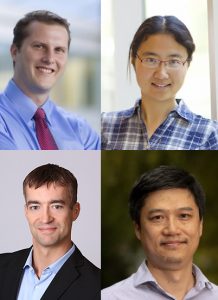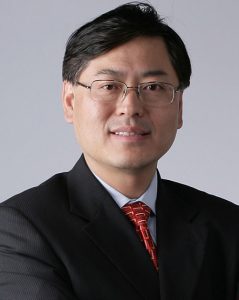
The UNC School of Medicine has named four researchers as recipients of the fourth annual Yang Family Biomedical Scholars Award. They are: Chad Pecot, MD, associate professor of medicine; Li Qian, PhD, associate professor of pathology and laboratory medicine; Gregory Scherrer, PhD, associate professor of cell biology and physiology; and Greg Wang, PhD, associate professor of biochemistry and biophysics. Pecot and Wang are members of the UNC Lineberger Comprehensive Cancer Center, Qian is associate director of the UNC McAllister Heart Institute, and Scherrer is a member of the UNC Neuroscience Center.
Each faculty member will receive a generous grant to be used at their discretion for biomedical research projects at the UNC School of Medicine. The researchers are now members of the Yang Family Society of Biomedical Scholars. The fourth annual seminar to highlight their work will be held later this year. The awards were made possible through donations from Yuanqing Yang, Chairman and CEO of Lenovo with additional financial support from Mr. To Hing Wu, an associate to Mr. Yang.
“Mr. Yang’s considerable support will help our most accomplished young researchers continue their innovative work to create new scientific knowledge and help improve the health of people around the world,” said Blossom Damania, Vice Dean for Research at the UNC School of Medicine and the Boshamer Distinguished Professor of Microbiology and Immunology. “Drs. Pecot, Qian, Scherrer, and Wang have already accomplished much in their short careers, and the UNC School of Medicine is proud to include them as our newest Yang Family Biomedical Scholars. Mr. Yang’s generous support allows our young faculty members to pursue new and fascinating research paradigms at a critical point in their careers.”

With the Yang Scholars program, the UNC School of Medicine aims to establish a community of its brightest and most promising young tenured faculty. The award recognizes faculty that have made significant scholarly contributions to their field while also receiving national recognition for their research.
“I am pleased to continue our support for research at the UNC School of Medicine and in particular these four fine investigators who earned this year’s award,” Yang said. “I believe their passion and important work in their chosen fields will lead to future biomedical breakthroughs to improve human health, and I am excited that UNC-Chapel Hill continues its great support of such work.”
Dr. Pecot has been an independent investigator at UNC-Chapel Hill since 2013, and thus far his research career led to several high-impact discoveries as a result of innovative ideas and establishment of synergistic collaborative teams focused on therapeutic RNA interference, sophisticated modeling of cancer metastasis and the tumor microenvironment, and the integrative use of complex bioinformatic and systems biology approaches to uncover key nodes in cancer networks. Because metastatic spread accounts for the greatest proportion of cancer-related deaths in the U.S. and worldwide, most of Pecot’s current work uses lung and triple-negative breast cancers as disease models with the hopes that our discoveries will also fundamentally impact treatment paradigms in other aggressive malignancies. As a cancer survivor, Dr. Pecot’s experience launched his career as an oncologist and continues to drive his work as a rising leader in cancer research.
Dr. Qian is conducting groundbreaking research with implications for basic mechanisms of cellular differentiation and high potential for translational and clinical impacts on regenerative medicine and heart health. Her innovative work on regenerating or repairing an injured heart includes using stem cell approaches to restore cardiac function following heart attacks. By seeking to understand the molecular basis of cardiac muscle cell function, Qian and her team strive to improve efficiency and clinical applicability of cellular reprogramming in heart disease. Her work has created a paradigm shift that changes how we think about cell differentiation and suggests new therapeutic approaches
Dr. Scherrer’s lab investigates the neurobiology of pain perception and the mechanisms of action of opioids. Pain is a complex and multidimensional experience with sensory and emotional components. His goal is to elucidate the mechanisms by which the nervous system generates the different dimensions of pain experience at the genetic, molecular, cellular, neural circuit, and behavioral levels, using the mouse as a model system. Dr. Scherrer seeks to identify the mechanisms of action of opioids to understand how these drugs alter activity in neural circuits to reduce pain but also lead to deleterious side effects such as tolerance, addiction, and respiratory depression. His lab is expanding our understanding of pain neurobiology and the mechanisms of action of opioids to develop solutions against chronic pain and the opioid epidemic by identifying novel non-addictive drug targets to treat pain and creating strategies to disassociate opioid pain relief from side effects.
Dr. Wang has developed a highly successful research program focused on the epigenetic changes that occur in cancers, along with development of potential new therapeutics. Using cutting-edge technologies including biochemistry-based discovery tools, CRISPR/Cas9-mediated genomic editing, and next-generation sequencing-based genomics profiling, he leads a research team to dissect and understand the mechanisms and pathways by which a particular gene alteration leads to development of cancer including aggressive acute myeloid leukemia and prostate cancer. His scholarly work covers a broad range from fundamentals of epigenetic and genetic regulation to translational works in drug discovery and therapeutics.
The work of this year’s Yang Scholars has been recognized by numerous prestigious awards. Dr. Pecot has received the ASCO Young Investigator Award, the Ben Love Fellowship in Cancer Therapeutics, the Jeffrey Lee Cousins Fellowship in Lung Cancer Research, the William Rippe Award for Distinguished Research in Lung Cancer, and has been featured as a V Scholar.
Dr. Qian is the recipient of the American Heart Association Katz Prize for Basic Research, the Boyalife Prize in Stem Cell and Regenerative Medicine, Triangle Health Care Hero Rising Star, American Heart Association Transformational Project Award, the Jefferson Pilot Award in Academic Medicine, Ellison New Scholar in aging, recognition by Cell Press as one of the top-quality scientific reviewers, and most recently the 2019 Phillip and Ruth Hettleman Prize for Artistic and Scholarly Achievement by Young Faculty.
Dr. Wang joined Dr. Qian as a co-recipient of this year’s Hettleman Prize. In addition, he is the recipient of a Leukemia/Lymphoma Scholar Award, V Foundation Scholar, Kimmel Scholar Award and awards from the American Society of Hematology and American Cancer Society, as well as a Department of Defense Cancer Research Award.
Dr. Scherrer is the recipient of the New York Stem Cell Foundation (NYSCF) Robertson Investigator Award, the International Narcotics Research Conference (INRC) Young Investigator Award, and the Rita Allen Foundation / American Pain Society (APS) Scholar Award.
The cutting-edge research of these four outstanding investigators has garnered national and international recognition, and the Yang Family Biomedical Scholars Award will allow them to push their discoveries forward in new and exciting ways.
Please join the School of Medicine in celebrating the new class of Yang Scholars at a seminar and reception on February 14, 2020 at 2:30 p.m. in 1131 Bioinformatics Building.
